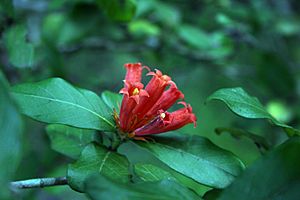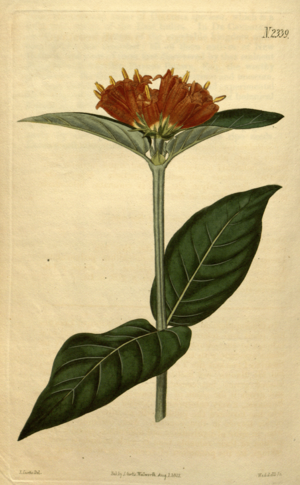Wild pomegranate facts for kids
Quick facts for kids Burchellia bubalina |
|
|---|---|
 |
|
| Burchellia bubalina | |
| Scientific classification |
|
| Kingdom: | Plantae |
| Clade: | Tracheophytes |
| Clade: | Angiosperms |
| Clade: | Eudicots |
| Clade: | Asterids |
| Order: | Gentianales |
| Family: | Rubiaceae |
| Genus: | Burchellia R.Br. |
| Species: |
B. bubalina
|
| Binomial name | |
| Burchellia bubalina (L.f.) Sims
|
|
| Script error: The function "autoWithCaption" does not exist. | |
| Synonyms | |
|
Genus
Species
|
|
Script error: No such module "Check for conflicting parameters".
Burchellia is a special group of flowering plants. It belongs to the Rubiaceae family, which also includes coffee plants! This group is called a monotypic genus because it only has one type of plant in it.
The only plant in this group is called Burchellia bubalina. You can find it growing naturally only in southern Africa. It lives in the Cape Provinces, KwaZulu-Natal, and the Northern Provinces in South Africa, as well as in Eswatini. People often call it "wild pomegranate" in English or "wildegranaat" in Afrikaans.
Contents
What Does Burchellia bubalina Look Like?
Burchellia bubalina can be a small bush or a tree. It can grow up to 8 meters (about 26 feet) tall. This plant has bright red flowers that stand out. Its bark is a cool grey-green color, and its leaves are a deep, dark green.
How People Use Burchellia bubalina
This plant is very popular for planting in gardens, especially in places where it doesn't get too cold. People grow it because it's a beautiful ornamental tree, meaning it's grown for its looks. Sometimes, it can spread easily and grow where it's not wanted, acting a bit like a weed in some areas.
The Story Behind the Name
The name Burchellia was given to honor William John Burchell. He was a brave explorer who traveled a lot in Africa.
How Scientists Classified It
A scientist named John Sims wrote about Burchellia bubalina in a science magazine called Curtis's Botanical Magazine in 1822. He explained how scientists before him had tried to classify this plant.
At first, some thought it was like a honeysuckle. But it didn't quite fit there. Then, another scientist, Persoon, grouped it with a plant called Cephælis.
Later, Mr. Brown realized it was different from any known plant group. So, he named it Burchellia to honor Mr. Burchell, the explorer. Mr. Sims agreed with the new genus name but wanted to keep the original species name, bubalina.
The plant comes from the Cape of Good Hope in South Africa. There, local people called it "Buffelhorn" or "Buffalo-Horn." This name came from how incredibly hard its wood is. The plant usually blooms in spring or summer. It needs warmth and protection from frost to grow well.
See also
 In Spanish: Burchellia bubalina para niños
In Spanish: Burchellia bubalina para niños
 | Madam C. J. Walker |
 | Janet Emerson Bashen |
 | Annie Turnbo Malone |
 | Maggie L. Walker |


